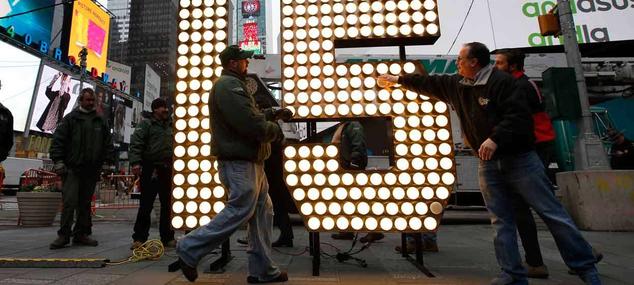PRINCETON, N.J. -- As 2014 ends, the attention of a nation turns to 2015 and how Americans' attitudes and opinions may change in the months ahead.
Politics
The political focus in 2015 will inevitably turn away from lame-duck President Barack Obama, and toward the maneuverings of the multitude of politicians who are in one way or the other thinking about running for president in 2016. Still, Obama has two years to go in his second term. And, despite facing a House and Senate controlled by the opposition party, he will likely continue to attempt to influence policy by using executive actions that allow him to work around Congress.
Obama's job approval rating rose slightly at the end of this year, fueled by an increase in his standing among Hispanics, who were reacting to his executive action on immigration announced in November. It also likely rose because of the increasingly positive views of the economy. Thus, Obama's approval rating in the coming year will continue to depend on his standing among Hispanics, a group that research shows is quick to change its mind about Obama. An increase in his approval rating among whites will likely depend on the economy, among other factors.
Congress' job approval rating should go up in January and in the following months because rank-and-file Republicans' views of Congress will likely rise as their party takes control of both houses. The lower rating of the divided Congress in recent years was partly because neither Republicans nor Democrats rated the institution very positively. But when one party has control of both houses, supporters of that party are typically much more positive toward Congress.
Whether Congress' approval rating remains improved may also depend on what the two chambers actually do in the new year. A number of prominent Senate members and, to a lesser degree, House members, are potentially running for president and thus looking at how their every action might affect their path to the party's nomination the following year. It is possible that Congress will continue to find itself beset by partisan feuding as these members jockey for position among presidential primary voters.
Obama's approval rating likely will not be dramatically affected by what Congress does. His rating dropped a few percentage points in October and November 2013, after the government shutdown, but remained above 40%, much higher than the all-time lows on that measure, earned by Harry Truman and Richard Nixon. Congress' job approval dropped to 9% in November 2013, the lowest in Gallup's history of rating that institution. If Congress appears to be doing nothing in the months ahead, Obama could look better by comparison.
Few presidents in the modern polling era have made it to a seventh year in office, so there is not a lot of historical context for Obama in 2015. But of the four presidents since 1952 who have served seven years, three -- Ronald Reagan, Bill Clinton and George W. Bush -- saw a decline in approval. Reagan, beset by problems associated with the Iran-Contra affair, saw his approval rating drop from 60% in his sixth year to 48% in his seventh -- a larger drop than Clinton or Bush experienced. The exception was Dwight Eisenhower, whose average in his seventh year was 64%, up from 54% the year before.
The Economy
Americans' views of Obama and Congress will partly depend on their views of what is happening to the economy. On that front, 2014 saw significant change. Americans' economic confidence shot up in the fourth quarter of the year, reflecting a stock market at record highs, lower gas prices, increasingly positive views of the job market, government data showing that unemployment is down and other positive indicators of economic growth in the U.S.
Despite this uptick in economic confidence, history suggests there is still a lot of room for improvement. Gallup began tracking economic confidence on a daily basis in January 2008 but asked the underlying questions that constitute the Economic Confidence Index for years prior to that. A review of these measures, particularly those obtained in the final years of the dot-com boom, shows just how economically positive Americans can become in the right circumstances.
Americans are now slightly more positive than negative about the economy's direction, with 49% saying the economy is getting better and 45% saying it is getting worse for the week of Dec. 22-28. This is a relatively good rating, and aside from two weeks in May 2013 when the measure was in net positive territory, last week marks the only time since January 2008 that it has been above water.
However, by comparison, the net positive gap on this getting better/getting worse measure is still low. The gap was as high as 46 points in January 2000, when 69% of Americans said the economy was getting better and 23% said it was getting worse. In similar fashion, although the current 27% who say the economy is excellent or good is an improvement from most of the readings in recent years, that percentage was above 70% multiple times in 1999 and 2000. In short, there is a lot of room for improvement in views of the current economy, based on where these views have been in fairly recent U.S. history.
Attitudes Toward Major Social Issues
It's difficult to neatly summarize current trends in Americans' views of moral, values and cultural issues, and therefore difficult to forecast what the future trends might be. While Americans have become more liberal on at least two significant issues -- same-sex marriage and marijuana legalization -- they show little sign of adopting a more liberal position on gun control or global warming.
As recently as 2009, 40% of Americans favored same-sex marriage, while 57% opposed it. Now, 55% favor it, and 42% oppose it -- a dramatic flip of opinion in just half a decade. Young Americans are significantly more likely than older Americans to favor same-sex marriage, giving rise to the hypothesis that attitudes will move further in a favorable direction as the years go on. This assumes that a) these young people maintain their more liberal attitudes as they move into middle age, and b) future generations of young people will have the same liberal attitudes as those who came before them.
This same age trends could affect views on marijuana. Eleven years ago, just about a third of Americans supported marijuana legalization; in contrast, majorities interviewed in 2013 and 2014 support its legalization. Younger Americans are much more likely than those who are older to support marijuana legalization, suggesting a continuing liberalization of attitudes in the years ahead -- if, as noted in the context of same-sex marriage, young people maintain their views as they age, and if rising cohorts of young people continue to have more liberal views.
At the same time that the country's views of same-sex marriage and marijuana have undergone significant short-term change, attitudes toward two other significant issues have not changed. Less than half of Americans favor stricter gun laws, and while this is slightly higher than what Gallup found from 2010 to 2012, it is below the prevailing sentiment in the years prior to that time. And in a fascinating turnabout in opinion, Americans are now much more likely to say that having a gun in the house makes it a safer, rather than a more dangerous, place to be.
Clearly, the examples of horrific gun violence in recent years that resulted in the deaths of innocent victims of all ages and in a variety of settings have not produced the change in attitudes toward guns that gun-control advocates have predicted.
Gallup's in-depth research on Americans' views on climate change in 2014 did not reveal any major shift in concern or focus on this issue. This is despite continuing efforts by climate-change researchers to point out the impact of what they consider to be one of the most significant threats to humans in history. This reflects the politicization of the issue, a process by which positions on the issue have come to reflect ideology and views of government's role in daily life, as well as questions of science. One would not expect to see significant changes in these attitudes in the year ahead, unless there are highly dramatic examples of climate change's effects, or unless climate-change activists can figure out a way to make this issue transcend politics.
Population Trends
Two trends relating to the underlying American population could affect public opinion in 2015.
The U.S. Census Bureau predicts that nonwhites will represent an increasing percentage of the overall population in the years ahead, particularly in key states -- driven by high nonwhite migration rates and the youthful skew of the large Hispanic population, which leads to proportionally higher numbers of Hispanic births. Additionally, the aging of the huge baby boom generation means the 65-and-older percentage of the population will continue to increase each year.
From a different perspective, state migration patterns will continue to have a significant effect on the nation in the years ahead.
The Census Bureau shows continuing major change in state populations, with six states -- Illinois, West Virginia, Connecticut, New Mexico, Alaska and Vermont -- actually losing population between 2013 and 2014 even as the country as a whole continued to grow. Many factors play into a state's population trends, including the relative balance between births and deaths (which is based on the age of the population) and migration into and out of the state. These migration patterns are in turn based on perceptions of job availability in a state, plus other factors that constitute a state's overall attractiveness. Gallup research shows huge differences in residents' views of their state as a place to live, ranging from 77% of residents in Montana and Alaska who rate their state as one of the best states to live in, down to only 18% of Rhode Island residents who rate their state similarly. Americans will continue to move to states where there are the best job opportunities. Additionally, if Americans continue to be less trusting of the federal government than of state governments, they may increasingly choose to live under a state government about which they hold positive views.

